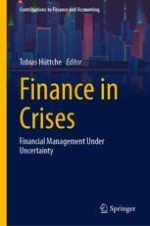2023 | OriginalPaper | Buchkapitel
Household Saving in Times of Crisis
verfasst von : Daniel Hoechle, Frank Graef
Erschienen in: Finance in Crises
Verlag: Springer Nature Switzerland
Aktivieren Sie unsere intelligente Suche, um passende Fachinhalte oder Patente zu finden.
Wählen Sie Textabschnitte aus um mit Künstlicher Intelligenz passenden Patente zu finden. powered by
Markieren Sie Textabschnitte, um KI-gestützt weitere passende Inhalte zu finden. powered by
